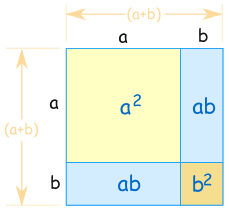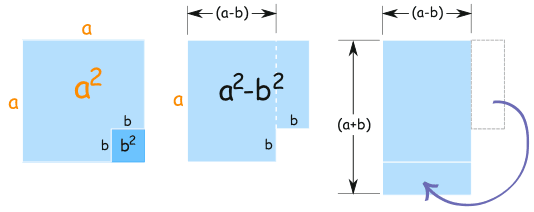Special Binomial Products
See what happens when you multiply some binomials ...
Binomial
A binomial is a polynomial with two terms
 |
| example of a binomial |
Product
Product means the result you get after multiplying
In Algebra xy means x multiplied by y
Likewise when you see (a+b)(a-b) it means (a+b) multiplied by (a-b), which we will be using a lot here!
Special Binomial Products
So when you multiply binomials you get ... Binomial Products
And we are going to look at three special cases of multiplying binomials ... so they are Special Binomial Products.
You can easily see why it works, in this diagram:

And then there is one more special case... what if you multiply (a+b) by (a-b) ?
(a+b)(a-b) = ... ?
(a+b)(a-b) = a2 - b2
That was interesting! It ended up very simple.
And it is called the "difference of two squares" (the two squares are a2 and b2).
This illustration may help you see why it works:
 |
a2 - b2 is equal to (a+b)(a-b)
|
Note: it does not matter if (a-b) comes first:
(a-b)(a+b) = a2 - b2
The Three Cases
Here are the three results we just got:
| (a+b)2 | = a2 + 2ab + b2 | } (the "perfect square trinomials") |
| (a-b)2 | = a2 - 2ab + b2 | |
| (a+b)(a-b) | = a2 - b2 | (the "difference of squares") |
Remember those patterns, they will save you time and help you solve many algebra puzzles.
Using Them
So far we have just used "a" and "b", but they could be anything.
Example: (y+1)2
We can use the (a+b)2 case where "a" is y, and "b" is 1:
(y+1)2 = (y)2 + 2(y)(1) + (1)2 = y2 + 2y + 1
Example: (3x-4)2
We can use the (a-b)2 case where "a" is 3x, and "b" is 4:
(3x-4)2 = (3x)2 - 2(3x)(4) + (4)2 = 9x2 - 24x + 16
Example: (4y+2)(4y-2)
We know that the result will be the difference of two squares, because:
(a+b)(a-b) = a2 - b2
so:
(4y+2)(4y-2) = (4y)2 - (2)2 = 16y2 - 4
Sometimes you can recognize the pattern of the answer:
Example: can you work out which binomials to multiply to get 4x2 - 9
Hmmm... is that the difference of two squares?
Yes! 4x2 is (2x)2, and 9 is (3)2, so we have:
4x2 - 9 = (2x)2 - (3)2
And that can be produced by the difference of squares formula:
(a+b)(a-b) = a2 - b2
Like this ("a" is 2x, and "b" is 3):
(2x+3)(2x-3) = (2x)2 - (3)2 = 4x2 - 9
So the answer is that you can multiply (2x+3) and (2x-3) to get 4x2 - 9
No comments:
Post a Comment